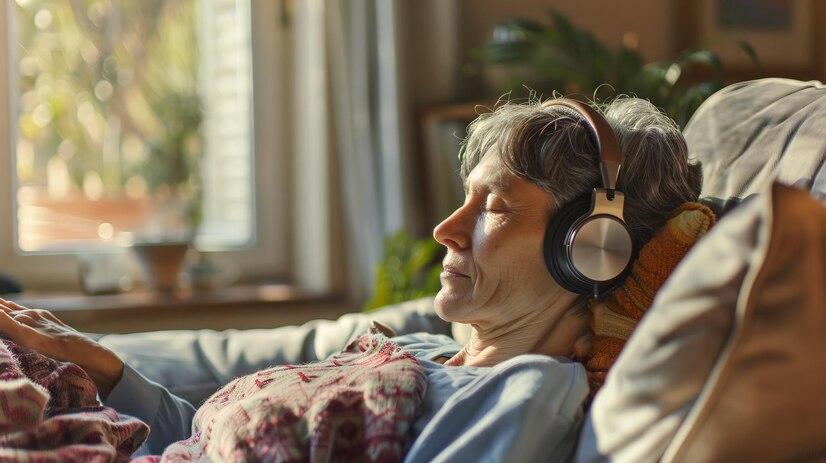Music in Caregiving is Important, Especially When it Comes to Dementia

Dementia is an illness that impairs a person's memory, reasoning, and communication skills. Dementia covers numerous diseases that affect memory, thinking, and decision-making. It can become increasingly difficult for dementia patients to speak and engage with others as the disease advances. A recent study demonstrated that a specific type of music therapy improved social interaction in dementia patients and their caregivers. This article describes how Home Care helps dementia patients through music therapy.
Why Music Matters in Caregiving
Incorporating music into dementia care plans improves the quality of life for caregivers and care recipients. In addition, giving back some of what dementia has taken improves the care recipient's quality of life. A charge that is calmer and better able to express them makes it easier for a caregiver to render more effective care.
Eases Dementia Symptoms
Repeatedly, researchers have observed music's ability to moderate common dementia symptoms.
- Anger
- Anxiety
- Depression
Music also controls dementia-related repetitive behavior, like consistently repeating a phrase or question.
Improves Memory
Music offers relief for dementia symptoms, mitigating memory impairment and fostering increased alertness. Individuals in cognitive decline often exhibit improved memory recall and communication when exposed to music. While music is not a cure for dementia, documented cases show individuals regaining recognition, countering the memory loss caused by the disease. Though modest, these gains represent significant progress in managing cognitive decline through the therapeutic power of music.
Improved Communication
As verbal communication abilities decline, non-verbal forms of expression become crucial. Music transcends language barriers, offering an alternative channel for communication. Caregivers can use music to establish connections, convey empathy, and facilitate meaningful interactions, enhancing the overall quality of the caregiver-patient relationship.
Enhanced Cognitive Function
Engaging with music activates various areas of the brain, including those related to memory and cognitive processing. Musical activities, such as singing or playing instruments, can stimulate cognitive function, promoting mental alertness and delaying cognitive decline. Regular exposure to music-based interventions has been associated with improved cognitive abilities in dementia patients.
Enhancing Daily Activities
Routine activities like mealtime or bathing can be challenging for dementia patients. Integrating music into these activities can transform them into more positive and enjoyable experiences. Caregivers can use music to establish routines, cue specific actions, and create a more structured and harmonious caregiving environment.
How to Use Music In Caregiving
It doesn't matter how far a loved one's dementia disease has progressed. It is always possible to try music therapy. Home Care Danville organizes music activities that are beneficial to both caregivers and patients. By listening to music, patients can lessen their anxiety and distress, improve their mood, and form strong bonds with their carers.
Choosing The Music
If you are unfamiliar with it or your loved one can't express their musical preferences, start with popular music from their youth, e.g., big bands or early rock and roll. You may have to experiment with different genres. Your loved one's reaction to the tunes will tell you when you've found the right music.
Don't Get Discouraged
A person with dementia may not respond to music immediately. This doesn't mean musical therapy isn't an option for your loved one. Playing the same songs repeatedly might elicit a reaction to the music.
Encourage Involvement in Music
Suppose your loved one listens to a song with lyrics; you sing along and encourage your loved one to do the same. If you play an instrument, accompany the song. As the melody plays, have your loved one clap their hands or move to the music in other ways.
Make A Playlist
Take note of the songs that provoke the most positive reaction from your loved one and compile them into a playlist.
Use Music Strategically
If your loved one struggles with hygiene and personal grooming, playing music in the bathroom can make the process smoother. Combining music with an activity can help someone with dementia stay better focused on the activity. If your loved one becomes irritable in the evening, also called sundowning, put on some soft, soothing music to manage sundowning symptoms.
Conclusion
In summary, incorporating music into dementia caregiving proves transformative, enhancing emotional well-being, alleviating symptoms, and improving communication and cognitive function. Home Care Danville offers initiatives to integrate music therapy, enabling caregivers to create a more enriching environment, fostering connections, and enhancing overall well-being for both themselves and their loved ones. Every note becomes a step towards improved care and a harmonious journey through the challenges of dementia.
- Art
- Causes
- Crafts
- Dance
- Drinks
- Film
- Fitness
- Food
- Spellen
- Gardening
- Health
- Home
- Literature
- Music
- Networking
- Other
- Party
- Religion
- Shopping
- Sports
- Theater
- Wellness


